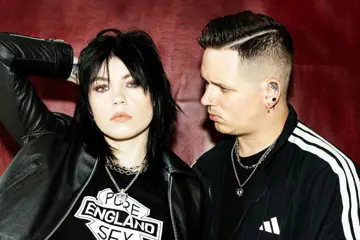 The Jezabels
The Jezabels"Try and get as much deep existentialism in the article as you can," suggests Hayley Mary. The 29-year-old singer of epic Sydney indie rockers The Jezabels once, infamously, told music critics to "get a real job", and confesses that her instruction is partly motivated by the fact that she finds "music journalism a bit boring." But, there's also been plenty of deep existentialism in our conversation. In a coffee shop in St Peters, Mary has talked about everything from population limits ("it's part of our evolution, our survival instinct is no longer going to be based on procreation"), to information-age overload ("sometimes I feel like I'm losing my mind"), to abandoning monogamy ("there's something problematic about this 'forever' model of relationships that removes you from the moment"). But, mostly the conversation has charted the contrast between the bleakness of life — the horrors of the modern world, the dark future of the planet, the inevitable death of everyone you've ever known and loved — with the miracle of being alive.
Given what The Jezabels have been going through during the past two years, it's no surprise the conversation is tinged with life, death and the philosophical. During the making of 2014's The Brink, Mary was battling a deep depression and keyboardist Heather Shannon was diagnosed with ovarian cancer. The latter fact remained private until earlier this year, when the band were forced to cancel tour dates in support of their third album, Synthia, due to Shannon's ongoing treatment.
"Because it came from such a negative thing, from illness, at first it felt really sad, and horrible," says Mary. "But, because it's such an intense situation, you're forced to look for a silver lining. Heather's quite good at that. You end up appreciating what you had a lot more, and then really looking forward to doing it again. That's a big positive: I've looked back on the last ten years of the band, where we've toured the world, played to thousands of fans; it's actually been quite a blessed life. Playing on stage is a magical experience, yet if you do it enough, you start taking it for granted. You don't really think about how lucky you are until something shit happens."
"Playing on stage is a magical experience, yet if you do it enough, you start taking it for granted."
Shannon's recovery — "she's currently in the clear, so it's all as positive as it could be at this current moment" — has allowed for The Jezabels to reschedule their tour dates, undertaking their first full tour in two years (including a performance at Rottofest, where Mary is looking forward to seeing both Alex Lahey and quokkas). Mary is keen to return to stage, because she's spent the past year "floating", unsure of what to do with herself. Having wanted to be a singer her whole life, at first she didn't know what to do with her newfound time. "It's not like I had a back-up plan, something else I could do if this band didn't work out," she offers. "I did feel quite lost, like I was wandering, wondering if we were ever going to play again."
Don't miss a beat with our FREE daily newsletter
Mary has spent much of this year living in London, working on an "ideologically-driven" electronic project with two brothers that's currently "all very under wraps, shrouded in mystery". She also, in the time off following The Brink, travelled, including a trip across Death Valley in a Mustang convertible that inspired the single Pleasure Drive. "I sort of went a bit mad, I've gotta say. I love touring, I love moving, I love that nomadic lifestyle. I'm kind of addicted to it. So, I ended up travelling a lot," Mary says. "It was kind of like a spiritual journey, but not through yoga or anything, more through partying and sex. A rock'n'roll kind of spiritual awakening."
Born in a time in which The Jezabels weren't touring, and Shannon was undergoing treatment for her illness, Synthia captures the conflict of this period. The album's epic sound and scope is, Mary says, representative of a band "in touch with larger questions at the time" of recording. "You can't separate the time in which you made the record from the record," she offers. "Illness definitely figures into the themes of the album, but also the sublime. Which is something you definitely do ponder when you ponder illness and death, and the shortness of life: you start noticing the beauty, and the sublime, in everything."
"A lot of it was to do with Heather's illness, both consciously and subconsciously. Quite intense life questions had been posed, and that gives you perspective on what you do. Why you love music, why you love making music. When you're faced with someone close to you being in that situation, you question everything. I'd been more of a negative person in the past, but there comes a point where you realise that's unsustainable. You need optimism to survive."















